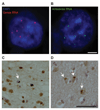C9orf72-mediated ALS and FTD: multiple pathways to disease
- PMID: 30120348
- PMCID: PMC6417666
- DOI: 10.1038/s41582-018-0047-2
C9orf72-mediated ALS and FTD: multiple pathways to disease
Abstract
The discovery that repeat expansions in the C9orf72 gene are a frequent cause of amyotrophic lateral sclerosis (ALS) and frontotemporal dementia (FTD) has revolutionized our understanding of these diseases. Substantial headway has been made in characterizing C9orf72-mediated disease and unravelling its underlying aetiopathogenesis. Three main disease mechanisms have been proposed: loss of function of the C9orf72 protein and toxic gain of function from C9orf72 repeat RNA or from dipeptide repeat proteins produced by repeat-associated non-ATG translation. Several downstream processes across a range of cellular functions have also been implicated. In this article, we review the pathological and mechanistic features of C9orf72-associated FTD and ALS (collectively termed C9FTD/ALS), the model systems used to study these conditions, and the probable initiators of downstream disease mechanisms. We suggest that a combination of upstream mechanisms involving both loss and gain of function and downstream cellular pathways involving both cell-autonomous and non-cell-autonomous effects contributes to disease progression.
Conflict of interest statement
The authors declare no competing interests.
Figures




References
-
- Woollacott IO, Mead S. The C9ORF72 expansion mutation: gene structure, phenotypic and diagnostic issues. Acta Neuropathol. 2014;127:319–332. - PubMed
Publication types
MeSH terms
Substances
Grants and funding
LinkOut - more resources
Full Text Sources
Other Literature Sources
Medical
Miscellaneous

